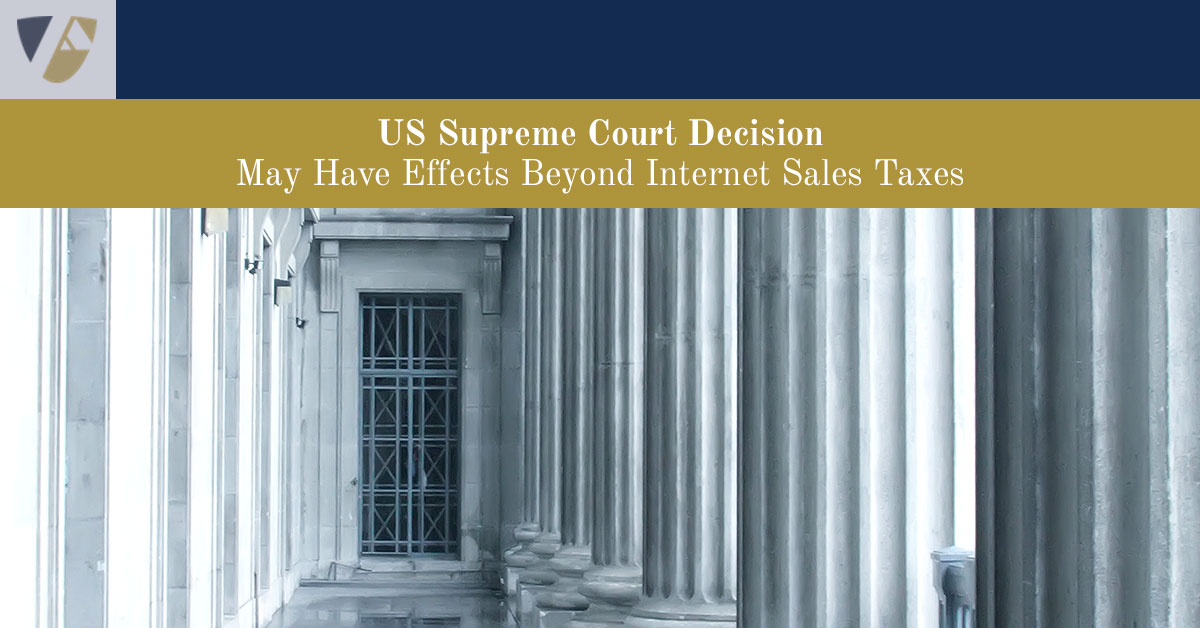CLIENT ALERT: US SUPREME COURT DECISION
MAY HAVE EFFECTS BEYOND INTERNET SALES TAXES
South Dakota v. Wayfair, Inc., et al.
585 US____ (2018)
Norman S. Newmark, JD, LLM (Taxation)
Rochelle Walk, JD
AEGIS Law
©2018 AEGIS Law All Rights Reserved.
Introduction.
IN a stunning reversal of prior constitutional precedent, the US Supreme Court held in the case of South Dakota v. Wayfair, et al., 585 US ___ (2018), that a state may require online retailers to collect and remit sales taxes. Under the prior cases of National Bellas Hess, Inc. vs. Department of Revenue of Illinois, 386 US 753 (1967) and Quill Corp. v. North Dakota, 504 US 298 (1992), decided before the onset of massive internet selling, the Supreme Court held that a state cannot impose sales tax collection duties on an out of state retailer doing business via common carrier, absent some physical presence in the state such as property or employees.
The Wayfair decision will have the immediate effect of opening the floodgates for state sales taxation of interstate and international internet sales. This decision impacts sellers in a multitude of online market places such as Amazon, Jet.com, Walmart.com, EBay.com and other web-based selling environments. More ominously, the decision may well lead to other forms of state taxation and regulation. Accordingly, e-commerce clients should review current sales and other activities in non-resident states, especially where there is more than a modicum of business, and determine if remedial action is required to avoid the imposition of unnecessary taxes, penalties and interest from those states, and perhaps other regulatory penalties.
Background.
Under the US Constitution, Congress is given the authority to regulate commerce among the states, Art. I, §8, commonly known as the “Commerce Clause” for short. The purpose of the Commerce Clause is to avoid disputes in connection with interstate transactions. However, the Supreme Court has never held that Congress has the exclusive authority to regulate interstate commerce. Instead, the Court has held that states have concurrent jurisdiction and may require interstate commerce to pay its fair share of state taxes, so long as the states do not impose an undue burden on interstate commerce and thus interfere with the prerogative of Congress under, and the purpose of, the Commerce Clause.
Hence a given state may impose taxes on interstate commerce, so long as (1) the activity being taxed has a “substantial nexus” to the state, (2) the tax is fairly apportioned, (3) the tax does not discriminate against interstate commerce, and (4) the tax is fairly related to the services which the state provides, Complete Auto Transit v. Brady, 430 US 274 (1977). If a given state tax fails one of the foregoing prongs of the Complete Auto Transit test, the tax will be held void in violation of Congress’ priority to regulate interstate commerce under the Commerce Clause. This is called the, “dormant Commerce Clause” doctrine and applies where Congress has failed to enact a statute on a given state level tax or other regulation.
The sole issue before the Supreme Court in the Wayfair case was whether the first prong of the Complete Auto Transit test, i.e. “substantial nexus,” required the retailer to have a physical presence in the state as determined under the National Bellas Hess and Quill decisions. The Supreme Court held that it did not, and thus from now on, retailers which make sales solely over the internet to customers in other states are now subject to the requirements of collection and remittance of sales taxes in those other states. Most significantly, there may be other fallout from the decision, as discussed in the analysis section.
Analysis.
There are a couple of immediate concerns for our e-commerce clients:
- CLIENTS SHOULD ANTICIPATE THEY WILL BE REQUIRED TO COLLECT AND PAY SALES TAX IN ANY STATE IN WHICH A CUSTOMER RESIDES OR TO WHICH IS HAS PRODUCT SHIPPED. States can be very aggressive in collecting taxes, sometimes even where modest amounts are involved. Even prior to the Wayfair decision, states were very creative in defining physical presence and finding substantial nexus under the Quill rule. See, e.g., Overstock.com, Inc. v. New York State Department of Taxation and Finance, 987 NE 2d 621 (NY App. 2013) (internet retailer had sufficient physical presence where unrelated in-state vendors, i.e. contractors, assisted retailer with sales).Indeed, some states went so far as to ignore or limit the Quill physical presence requirement in contexts other than sales taxes. See KFC Corp. v. Iowa Department of Revenue, 792 N.W.2d 308 (IA 2010) (no physical presence required for state income tax where franchisor licensed name and trademarks in state). In that case, the Iowa Supreme Court took pains to note that the Quill physical presence test applied only to sales taxation, where compliance with numerous taxing jurisdictions and collections from third party customers would be a burden on interstate commerce, whereas state income taxation would not.
Accordingly, as a result of the removal of the physical presence test by the US Supreme Court, clients can expect increased state collection activity not only on sales taxes but on income and other taxes, as well as state regulation, even if business is only done remotely over the internet.
- COMPLIANCE WILL BE A CHALLENGE AND AN INVESTMENT IN TAX MANAGEMENT SOFTWARE OR A QUALIFIED THIRD-PARTY RESOURCE WILL BE NEEDED. There are over 9,600 state and local taxing jurisdictions in the US, and hence national retailers must now invest in or create software to track sales in each and every one of those jurisdictions where sales take place. Compliance software and services are available, but not inexpensive and often the information needed to comply is hard to obtain from the online marketplace. While some online marketplaces will collect the tax for a seller, the reporting is usually left to the online seller. And mastering the details of these laws can be daunting. Retail clients can expect immediate increased compliance costs, and other clients will need to determine if their activities fall under state sales and use tax regimes as taxable retail sales for each state. These will be expensive exercises.
- INTERNATIONAL SELLERS MAY FIND LIENS AND OTHER ASSESSMENT OF GOODS STORED IN THE US. It is unclear how this law will impact international sellers. Assuming the international seller has no nexus or contacts in the US but simply sells product through a marketplace such as Amazon.com, it is unclear how those businesses will be pursued. Most today are not collecting sales tax, however, if they enter into transactions to sell their business, they may find liens or other barriers in the transaction. Further, representations and warranties made to buyers in the transaction documents will likely require disclosure regarding compliance with tax laws such as these.
A few potential solutions:
- First, the court left open the possibility of challenges under other prongs of the Complete Auto Transit test. Hence a seller might successfully challenge a given tax if the tax is out of proportion to the benefits derived by the seller or otherwise discriminates against interstate commerce.
- Second, inasmuch as Wayfair is a Commerce Clause decision, Congress can enact overriding legislation preventing burdensome state taxation, and indeed there are pending bills addressing the matter. We’ll see if there is enough public outcry to force enactment of a statute. If so, one hopes for the requirements of a uniform state sales (and perhaps income) tax rate enacted by each state, and de minimis sales exemptions, for ease of administration.
- Third, the Wayfair decision upheld the South Dakota law in question in part because the law imposes the tax only if a retailer makes more than a minimum level of sales, and because the tax was not retroactive. Hence if a state seeks to impose taxation on a single or a few isolated sales, perhaps an argument can be made that there is no substantial nexus. Any retroactive application might also be deemed unconstitutional.
- Fourth, Congress has already limited the ability of states to impose income taxes on certain sellers by federal statute, i.e. the statute commonly known as the “Interstate Income Act of 1959” or “PL 86-272” for sellers of tangible personal property. Clients can and should defend against such taxation as and when the statute is applicable.
Conclusion.
Congress may well enact remedial legislation, but then again, 2018 is an election year. In the meantime, clients should review outstate sales and activity and take remedial actions, including as applicable, obtaining appropriate sales tax licenses and collecting taxes, and reviewing potential income tax and other regulatory liability. Clients should also expect more aggressive state collection activities in the ensuing months, even from states where client business activity is small.
AEGIS Law stands ready to help. We will work with you and your accounting team to develop strategies for minimizing the impact of the Wayfair decision, and, if necessary, defend your business in court or via administrative appeal.
For more information, please contact your AEGIS attorney, Norman S. Newmark, head of the AEGIS Law tax department, at (314) 454-9100 x117 or nnewmark@aegislaw.com, or Rochelle Friedman Walk, the e-commerce practice, at (813) 999-0199 ext. 115 or rwalk@aegislaw.com.
 Norman Newmark’s practice is focused on tax, estate planning and corporate matters, and he serves as the head of the firm’s tax department. He has an extensive transactional practice involving sophisticated trusts, business entity formation, mergers and acquisitions, buy-sell agreements, and other recognized planning for individuals, health care practices, businesses and non-profit entities. Norman handles probate matters ranging from ordinary estate administration to trust litigation. He has represented individuals and businesses before the Internal Revenue Service and the tax departments of various states. As part of a bar subcommittee, Norman drafted key provisions of the Missouri Uniform Powers of Appointment Act recently passed by the Missouri General Assembly and signed into law by the governor.
Norman Newmark’s practice is focused on tax, estate planning and corporate matters, and he serves as the head of the firm’s tax department. He has an extensive transactional practice involving sophisticated trusts, business entity formation, mergers and acquisitions, buy-sell agreements, and other recognized planning for individuals, health care practices, businesses and non-profit entities. Norman handles probate matters ranging from ordinary estate administration to trust litigation. He has represented individuals and businesses before the Internal Revenue Service and the tax departments of various states. As part of a bar subcommittee, Norman drafted key provisions of the Missouri Uniform Powers of Appointment Act recently passed by the Missouri General Assembly and signed into law by the governor.
 Rochelle Friedman Walk, Esq. is an experienced, thoughtful and strategic attorney, business executive and neutral mediator. She has been court-appointed as a receiver and mediator, and is a member of the FINRA arbitration and mediation panels. She is known for her negotiating skills and the ability to bring parties together in win-win, creative solutions. She offers a practical and business-oriented approach to the practice of law. Her background in business enables her to relate well to clients and to quickly define the work and potential solutions.
Rochelle Friedman Walk, Esq. is an experienced, thoughtful and strategic attorney, business executive and neutral mediator. She has been court-appointed as a receiver and mediator, and is a member of the FINRA arbitration and mediation panels. She is known for her negotiating skills and the ability to bring parties together in win-win, creative solutions. She offers a practical and business-oriented approach to the practice of law. Her background in business enables her to relate well to clients and to quickly define the work and potential solutions.




